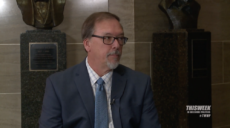JEFFERSON CITY, Mo. – Right-to-work has preoccupied Rep. Holly Rehder, R-Sikeston, for the first month of session, but now that Gov. Eric Greitens has signed the monumental piece of legislation, she will move onto her next major legislative priority: initiating a prescription drug monitoring program in Missouri.
For the third year in a row, Rehder will carry legislation designed to implement such a plan in the state. Like last year’s bill, this version of the bill, called the Narcotics Control Act, will monitor the prescription of all schedule II, III and IV drugs, including opiates. An automated system would then flag certain patients who may be going to multiple doctors to pick up far more of these prescription drugs than they need, also called doctor shopping, to feed an addiction to opiates.
“They have authorization now to look at this information… to call a pharmacy and get this information,” Rehder said. “This is simply giving physicians and pharmacists the tool to make the best medical decisions for their patient.”
Missouri has become infamous as the only state without a PDMP, a status it has held since 2014. While Missouri has not suffered the worst consequences nationally in the nation’s opioid epidemic, the state has seen a steady increase in deaths, according to the Department of Health and Senior Services. The department said in 2015 that 93 people out of 1 million in Missouri had died from opioid-related deaths in 2014, far above the national average of 59 per million.
Medical experts ascribe much of the epidemic to the over-prescribing of opiate-based painkillers like oxycodone, morphine and even codeine, which can become addictive. If an addicted patient can no longer get enough of those drugs, they may move to heroin or other illegal opiates, or they may try to doctor shop to feed that addiction.
A PDMP can flag those addicts and allow doctors to intervene, giving medical professionals a chance to treat the opioid addiction. Rehder knows first hand exactly what that step can mean for someone. She has often repeated the story of her own daughter, who fell into a lifetime of drug addiction after taking prescription opiates as part of her treatment for a high school sports injury.
Rehder is joined in the effort by freshman Rep. Fred Wessels, D-St. Louis. Their bills were both heard Tuesday afternoon in the House Insurance Policy Committee, and chairman Rep. Kevin Engler intoned he would combine the two pieces of legislation. In the Senate, Sens. Dave Schatz, R-Sullivan, and Jill Schupp, D-St. Louis, are offering highly similar legislation that will be heard in committee Thursday morning.
The immovable object
Sen. Rob Schaaf, R-St. Joseph, has consistently opposed such measures, even offering up his own, albeit different, version of the bill this year. In the past, he had concerns that Rehder’s legislation does not maintain constitutional privacy rights, puts private personal medical information in the hands of any medical provider in the state, and creates additional government databases.
Ron Calzone, a member of the board of directors for Missouri First, testified against Rehder’s bill Tuesday. He echoed the same concerns as Schaaf.
“The Founding Fathers, when they developed the Fourth Amendment, they were concerned about government intrusion on private matters,” he said. “This is a core liberty issue and don’t take lightly that we’re creating a new government database.”
Rehder argues her current iteration of the bill will not do any of the things Schaaf and Calzone fear. In fact, she says the growing number of counties and municipalities adopting their own PDMPs could lead to the potential for more irregularities between the various provisions.
“If privacy is truly the senator’s concern, then surely he would rather have one statewide program versus a piecemeal approach,” Rehder said.
Currently, St. Louis City and County, as well as Boone, Ste. Genevieve, St. Charles, Ste. Genevieve, Jackson, and Cole Counties all have their own individual PDMPs, with Greene County considering the possibility of joining that list. Separate municipalities in Jefferson County have also pursued PDMPs, and thus far Arnold, the county’s largest city, has adopted one. Rehder says that amounts to roughly half of the state’s population.
Needle exchange
In addition to her PDMP bill, Rehder will also carry a bill allowing needle exchanges in Missouri. Missouri’s two current needle exchanges, one in Kansas City and one in St. Louis, currently operate off-the-books because selling or distributing drug paraphernalia, including needles, is a Class E felony. Rehder views this as another way to help those suffering from opiate addictions.
Chad Sabora, the director of legislative advocacy for the Missouri Network for Opiate Reform and Recovery, testified in favor of her bill. He runs the needle exchange in St. Louis.
“With the influx of opiates and other drugs, the fear of using a needle has gone away,” Sabora said after stating that needle drugs used to be taboo at the peak of the HIV/AIDS epidemic. “Unfortunately, we’re going to see more people move towards IV drug use. We have to help them.”
















